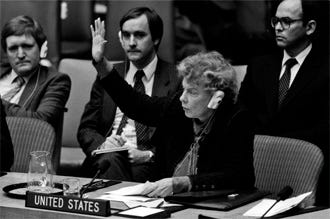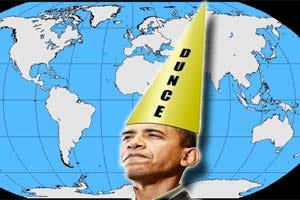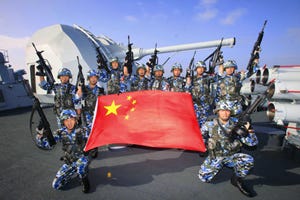Jean Krikpatrick: How to win against China
Opinion: Of all the foreign policy experts to represent the United States in world affairs, Jean Kirkpatrick made the most impact and literally changed the world.
Recently James Pinkerton writing for Breitbart.com notes, "This year marks the 40th anniversary of Jeane Kirkpatrick’s 'Dictatorships and Double Standards,' an essay that changed the world. Commentary magazine, which published all of its 9,800 words, calls it 'The Classic Essay That Shaped Reagan’s Foreign Policy'—and few would argue.
Pinkerton continues:
In 1981, Kirkpatrick was named by President Ronald Reagan to be the U.S. ambassador to the United Nations, and the rest is history. The decisions made by Reagan in the early 80s, with Kirkpatrick as a key adviser, led, just a few years later, to the fall of the Berlin Wall and the collapse of the Soviet Union. Changed the world, indeed.
And yet even with the Soviets gone, today, another empire, China, threatens us. Indeed, the Chinese, at the rate they’re going, could prove to be more of a threat to us as than the Soviets at their worst. So just what was it in Kirkpatrick’s article that made it, and her, so influential? And why is it worth remembering four decades later?
In her piece, Kirkpatrick focused on the foreign-policy failings of President Jimmy Carter, who had so badly mishandled the Cold War against the Soviets. The immediate issue, back then, was that the Carter administration was more critical of non-democratic allies than of actively anti-democratic enemies. Hence the “double standard” in Kirkpatrick’s title; our non-democratic allies were scorned, while our anti-democratic enemies were sometimes even praised. Indeed, the Carterites seemed determined actually to depose pro-American autocratic regimes, thus paving the way for pro-Soviet totalitarian regimes.
As Kirkpatrick wrote, “It is this belief which induces the Carter administration to participate actively in the toppling of non-Communist autocracies while remaining passive in the face of Communist expansion.” Kirkpatrick thus put her finger on a central and enduring aspect of liberalism: namely, the instinct to focus intensely on the small flaws of friends, while being blind to the larger flaws of foes. She derided this liberal impulse as a formula for “self-abasement and apology.” And we might add that this mindset never seems to change—hence, decades later, Barack Obama’s notorious “apology tours.”
There is much more on Breitbart.com worthy of consideration, but Pinkerton writes in summary:
Meanwhile, beyond China’s borders, the Belt and Road initiative of the People’s Republic, while officially peaceful and cooperative, is, in fact, a key part of that country’s bid for global dominion. It was Bloomberg News—not exactly a mouthpiece for hawks—that summed up China’s goals in a stark headline late last year: “Xi Jinping’s Plan to Dominate the World.” And oh yes: the Chinese are also busy hacking into America; there’s a new report on China’s cyber-espionage against the U.S. virtually every day.
So today, Pompeo and the Trump administration, operating as Kirkpatrick-type realists, believe that the U.S. has an affirmative duty to look out for itself. And that means, as a matter of strategic necessity, allying with other countries that also fear China’s rise. We can worry about the nature of those governments later; the first priority is to make sure that we don’t lose the greater geopolitical struggle.
For more from James Pinkerton, click here.






